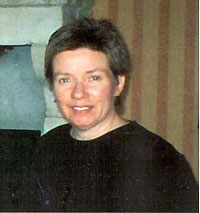Respected Professor Remembered By Colleagues
 |
Joan Coffey
|
Beloved associate professor of history Joan Lueder Coffey died on Aug. 13, 2003,
after an eight-year battle with Waldenstrom's macroglobulinemia,
a rare, chronic cancer that affects plasma cells.
"She was a woman of great grace and dignity," said history department chair
Jim Olson. "Both a teacher and a scholar, she took her teaching very seriously
and had very high standards for students, probably the highest in the department.
She really had a renowned reputation as a historian and certainly a wonderful
reputation as a teacher here."
Those sentiments were echoed throughout the department. "We all just
loved her," said history secretary Charlann Morris. "She was wonderful."
"She was very graceful, I put her on a pedestal. I would say she was a wonderful
mentor and a wonderful colleague," said Tracy Steele, associate professor in
the department. "I just adored Dr. Coffey; she was a wonderful friend,
colleague."
Not only adored by her fellow teachers, Coffey was also adored by her students.
"I had Dr. Coffey several years ago, and I thought she was a wonderful teacher.
I really liked the way she taught, and she seemed to communicate with the class
very well," said Wesley Jensen, who graduated with a psychology degree and is
now applying for graduate school in the history department. "I thought she was
an interesting lady. Some history professors make things very boring, but she
was able to bring a lot to her class as a professor that really surprised me."
Coffey's death came just days before her only book, Leon Harmel, Entrepreneur
as Catholic Social Reformer, was to be published by the University of Notre
Dame Press, a "top-notch, scholarly press for historians," according to Olson.
Though the book is not yet out, Coffey was able to see it after the press was
informed that she was in a rapid state of decline a few weeks before she died.
"They sent it to print in New Jersey, with a kind of 'mom and pop' print shop
out there, and they kind of told this printer, 'hey this woman is dying, and
we would really like to accelerate this so she could see it before she goes',"
Olson said. "So this guy worked, I guess, a couple of nights 24-hours straight
to get it out.
"Then the press had to send it to New York City to have a binder hand bind
it, not machine bind it because there was only one copy of it. They got someone
to do that," he said. "Then, they sent it by courier down to her, down to MD
Anderson where she spent the last six weeks of her life. They got it to her,
she held it, was able to look at it and was thrilled with it. Then she died
a day or two later."
Coffey was so thrilled with the book that she asked to be buried with it. Her
funeral was Aug. 16.
Coffey wasn't the only one thrilled with it. The book, a culmination of articles
and years of research and writing, has received praising reviews, according
to assistant professor Susannah Bruce.
"The publisher told us that every scholar that the publisher contacted for
early reviews praised it, which is unheard of," Bruce said. "The University
of Notre Dame Press has never had that happen before."
Bruce, who has read part of the introduction, said Coffey's writing style is
fabulous.
"She blends masterful and dedicated scholarship and research with a gift for
writing and engaging her readers," she said.
A graduate of Barat College, now Barat College of DePaul University, in 1965,
and receiving her master's and doctoral degrees from the University of Colorado
in 1986 and 1990, respectively, her dedication to academia was also revealed
on the day of her funeral through a gesture by her husband.
"She was buried in her cap and gown from the University of Colorado," Olson
said. "Her husband decided it was most appropriate for her."
Coffey had been scheduled to teach at SHSU this semester, though Olson said
they knew it might not be a possibility, with signs of her decline arising in
the spring.
"Nobody's irreplaceable, but she's about as close as someone can get to being
irreplaceable. She was a peacemaker, a woman of patience and logic. She took
pride in the accomplishments of her colleagues; there was no jealousy in her,"
he said. "She was about as good as they come. We'll miss her and won't be able
to replace her. I don't think we'll be able to find someone who combines the
intellectual and humane qualities that she had."
- END -
SHSU Media Contact: Jennifer Gauntt
Aug. 21, 2003
Please send comments, corrections, news tips to Today@Sam.edu
|


